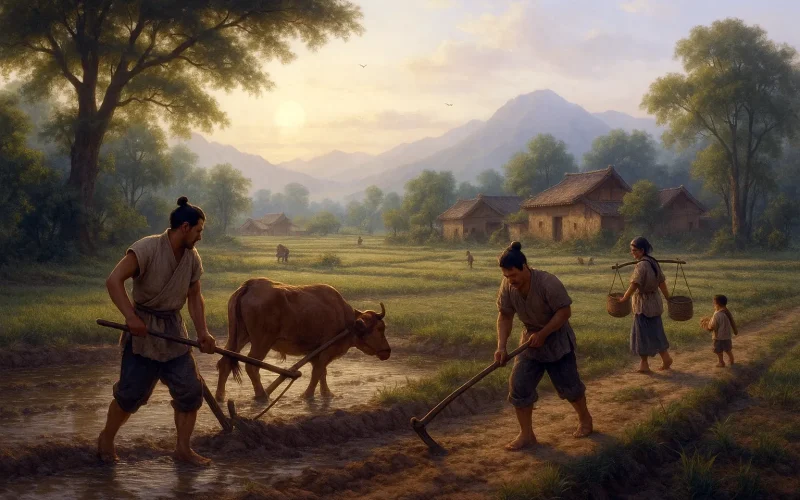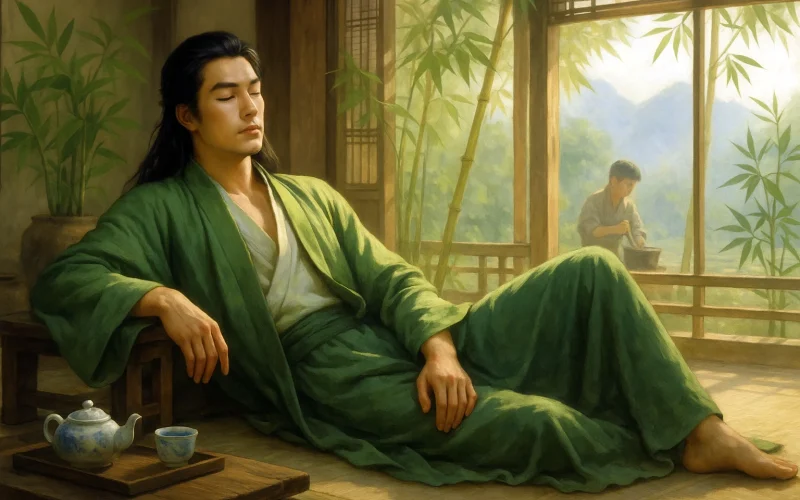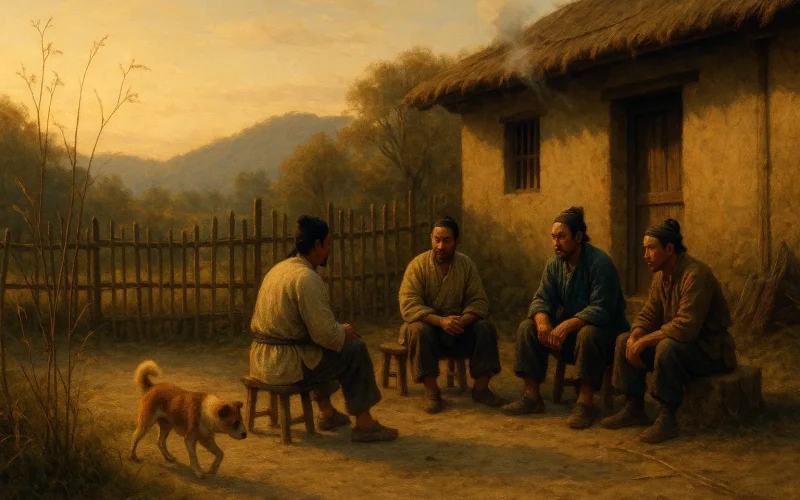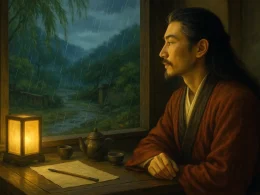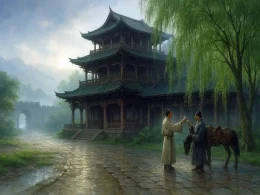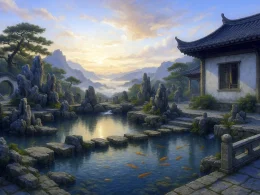Before dawn we gulp cold rice,
Oxen plod east through clay.
Cocks crow—lanterns slice
Night's veil off field-work's day.
Ploughshares clank, kites wheel low,
Bodies break like worn-out tools.
All harvests feed taxes—so
We sleep like drained dry pools.
Sons grow tall, but mark it well:
Their fate's the same old hell.
Original Poem
「田家三首 · 其一」
柳宗元
蓐食徇所务,驱牛向东阡。
鸡鸣村巷白,夜色归暮田。
札札耒耜声,飞飞来乌鸢。
竭兹筋力事,持用穷岁年。
尽输助徭役,聊就空自眠。
子孙日已长,世世还复然。
Interpretation
This series of poems was composed during Liu Zongyuan's exile in Yongzhou or Liuzhou. In 805 AD, the first year of the Yongzhen era, thirty-three-year-old Liu Zongyuan, having participated in the failed "Yongzhen Reforms," fell overnight from Vice Director of the Bureau of Receptions to Marshal of Yongzhou. This political catastrophe flung him from the center of power to the margins of society, yet it also gave him the opportunity to intimately observe the real lives of the southern peasantry. Yongzhou, located in southern Hunan, was remote and impoverished, utterly unlike the prosperity of Chang'an. As an exiled official "awaiting punishment," Liu Zongyuan, though devoid of real authority, could leave his study and personally witness the hardships and struggles of peasant labor. This poem series is the fruit of his profound observation of rural reality.
Part One traces the farmer's daily labor, from leaving before dawn to returning at dusk, from exhausting physical strength to forfeiting the harvest, ultimately revealing the tragic fate of peasants exploited generation after generation with no escape. Gone is the serene austerity of Liu Zongyuan's landscape poetry; here there is only a sober, almost documentary, rigor and anguish, embodying his conscious pursuit of "intervening in reality through poetry and prose."
First Couplet: "蓐食徇所务,驱牛向东阡。"
Rù shí xùn suǒ wù, qū niú xiàng dōng qiān.
A hurried breakfast eaten upon the rush-mat floor,
Then driving the ox east towards the waiting field.
The poem plunges directly into the scene of labor. The phrase "hurried breakfast eaten upon the rush-mat floor" carries immense weight—"rush-mat floor" signifies haste and simplicity; eating upon it implies rising before dawn, too hurried for a proper table. The phrase "towards the waiting field" conveys rushing to fulfill duties, not daring to slacken, betraying the farmer's compulsion by subsistence. The phrase "driving the ox east"—the verb "drive" applies both to the ox and subtly hints at the farmer himself being driven. These brief ten characters sketch the farmer's daybreak: haste, passivity, helplessness.
Second Couplet: "鸡鸣村巷白,夜色归暮田。"
Jī míng cūn xiàng bái, yèsè guī mù tián.
Rooster's crow, lanes whitening in dawn's faint glow;
Night falls, returning from dusk-dimmed fields.
These lines outline the length of the labor through its temporal brackets. "Rooster's crow" followed by "lanes whitening" speaks of the early start—rising with the first crow, heading to the field as dawn breaks. "Night falls, returning" speaks of the lateness of return—trudging home only when dark has fallen. Between these two moments lies a full day of exposure, bending, and sweat. The poet does not directly describe the toil, only its duration, yet the long span from "rooster's crow" to "night" makes the reader feel the farmer's exhaustion and hardship.
Third Couplet: "札札耒耜声,飞飞来乌鸢。"
Zhá zhá lěi sì shēng, fēi fēi lái wū yuān.
The thud of plow in earth, a steady, sodden sound;
Above, the crows and kites come wheeling, circling round.
The focus shifts from the general to a specific detail. "The thud of plow" is the onomatopoeic sound of the plow breaking soil, the monotonous, repetitive soundtrack of the farmer's day-in, day-out life. The line "Above, the crows and kites come wheeling" is especially thought-provoking—crows and kites, carrion birds. They circle the field, waiting for insects turned up by the plow, but also symbolize watchful, covetous eyes: the farmer's labor is not yet done, but those waiting to snatch the fruits are already circling above. This image is both realistic and rich in symbolic meaning, foreshadowing the "forfeit" of the harvest to come.
Fourth Couplet: "竭兹筋力事,持用穷岁年。"
Jié zī jīnlì shì, chí yòng qióng suì nián.
To spend his body's strength in this exhausting way,
Is but to see the year's poor portion through.
Here, description gives way to reflection, pointing out the meagerness of the farmer's goal—"spend his body's strength" describes the physical drain; "see the year's poor portion through" states the aim is merely to survive the year. The word "poor" is double-edged, meaning both "to get through" and "poverty/meagerness." Exhausting oneself all year yields only bare survival. This couplet distills the farmer's condition into a universal fate: not pursuit of betterment, but mere survival.
Fifth Couplet: "尽输助徭役,聊就空自眠。"
Jǐn shū zhù yáoyì, liáo jiù kōng zì mián.
The harvest all rendered up for corvée and for tax,
He turns to sleep, his stomach hollow, all in vain.
This is the poem's most anguished stroke. "The harvest all rendered up" lays bare the cruelty of official exaction—not a portion paid, not even subsistence kept, but "all rendered up." The meager yield won by "spend[ing] his body's strength" ends as tribute "for corvée and for tax." The word "hollow" in "his stomach hollow" signifies both an empty belly and empty hands, empty hope. A day of toil, and he can only turn in, emptied—what meaning has such a life?
Sixth Couplet: "子孙日已长,世世还复然。"
Zǐsūn rì yǐ cháng, shì shì hái fù rán.
His children, they grow daily, as the years unfold,
The same, the same, the same, the same old tale is told.
The final couplet widens the view from the present to the future, revealing the most despairing reality: this fate of exploitation and plunder will not change as the "children" grow, but will repeat for generation after generation. The words "The same, the same" are calm, yet carry a bone-deep desolation. It is not for lack of children, not for lack of toil, but all effort is caught in a cycle with no end, no hope. The poet ends here, with no direct comment, no direct indictment, but the criticism of systemic oppression is searing.
Holistic Appreciation
The poem takes a day's labor as its thread, from dawn to deep night, from a rushed meal to an empty sleep, unfolding the layers of the farmer's fate as time advances. The first four lines tell the hardship of toil—leaving early, returning late, physical strength spent. The middle two lines, with the "crows and kites" metaphor, hint at a coveted fate. The last four lines tell the tragedy of the harvest—all taken by the state, sleeping emptied, and for generation after generation, with no change.
The structure is clear, each layer building. The language is simple, almost colloquial, yet every word is weighty, every line blood-tipped. The poet does not look down with condescending pity, but lets the facts speak. Without strident criticism, the effect is more powerful than any direct denunciation. This is the unique quality of Liu Zongyuan as a "poet of society"—sober, and therefore profound; restrained, and therefore moving.
Artistic Merits
- Unadorned Description, True and Unsparing: The poem uses little ornament, sketching a day of a farmer's toil and fate with a truth that is almost cruel.
- Vivid Details, Evocative Imagery: "The thud of plow" describes sound, "crows and kites come wheeling" describes sight, the details are sharp. The "crows and kites" image is both real and symbolic, thought-provoking.
- Clear Structure, Steady Progression: Follows a temporal order, from morning to night, from toil to "harvest," from present to future, each step building, each part connected.
- Simple Language, Profound Connotation: The lines are plain, yet hold deep compassion and criticism, showing Liu Zongyuan's art of "using common words to express un-common pain."
Insights
This poem first makes us see the overlooked people. In classical poetry, the countryside is often beautified, the farmer often poetically transformed into a carefree "rustic." But Liu Zongyuan tears off this veil, letting us see the real peasant—not a picturesque embellishment, but the exploited, forgotten underclass. In contemporary society, this "seeing" remains vital: those whose labor feeds and builds our cities—do we truly attend to their conditions of existence?
Secondly, the phrase "The harvest all rendered up for corvée and for tax" prompts reflection on systemic injustice. The peasant's tragedy is not personal laziness or incompetence, but entrapment in a predatory system—they "spend [their] body's strength" but "render up" everything; "children… grow daily" yet "the same old tale is told." This reminds us: The roots of many social problems lie not with individuals, but with systems. Changing fate requires not just personal effort, but pushing for systemic improvement and justice.
This poem also teaches us about literature's moral responsibility. Liu Zongyuan could have written of landscapes, of leisurely pursuits. He chose instead to speak for the underclass. This stance of "chronicling the common people, preserving a record of suffering" establishes his unique place in literary history. Today, as literature grows increasingly oriented toward entertainment and the personal, we still need such voices—writing that records its era, reveals truths, transmits compassion—that is truly powerful literature.
Finally, the poem's quality of "not spelling it out" is especially worth learning. Facing such injustice, Liu Zongyuan does not cry to heaven, does not launch into impassioned rhetoric. He simply lets the reader see the figure laboring amidst the "thud of plow," the harvest coveted beneath the "wheeling" birds, the cycle of "the same old tale" told as "children… grow daily." This calm presentation is more piercing than any indictment. It teaches us: facing suffering, quietness can sometimes be more powerful than agitation; presentation can sometimes touch hearts more than commentary.
About the Poet
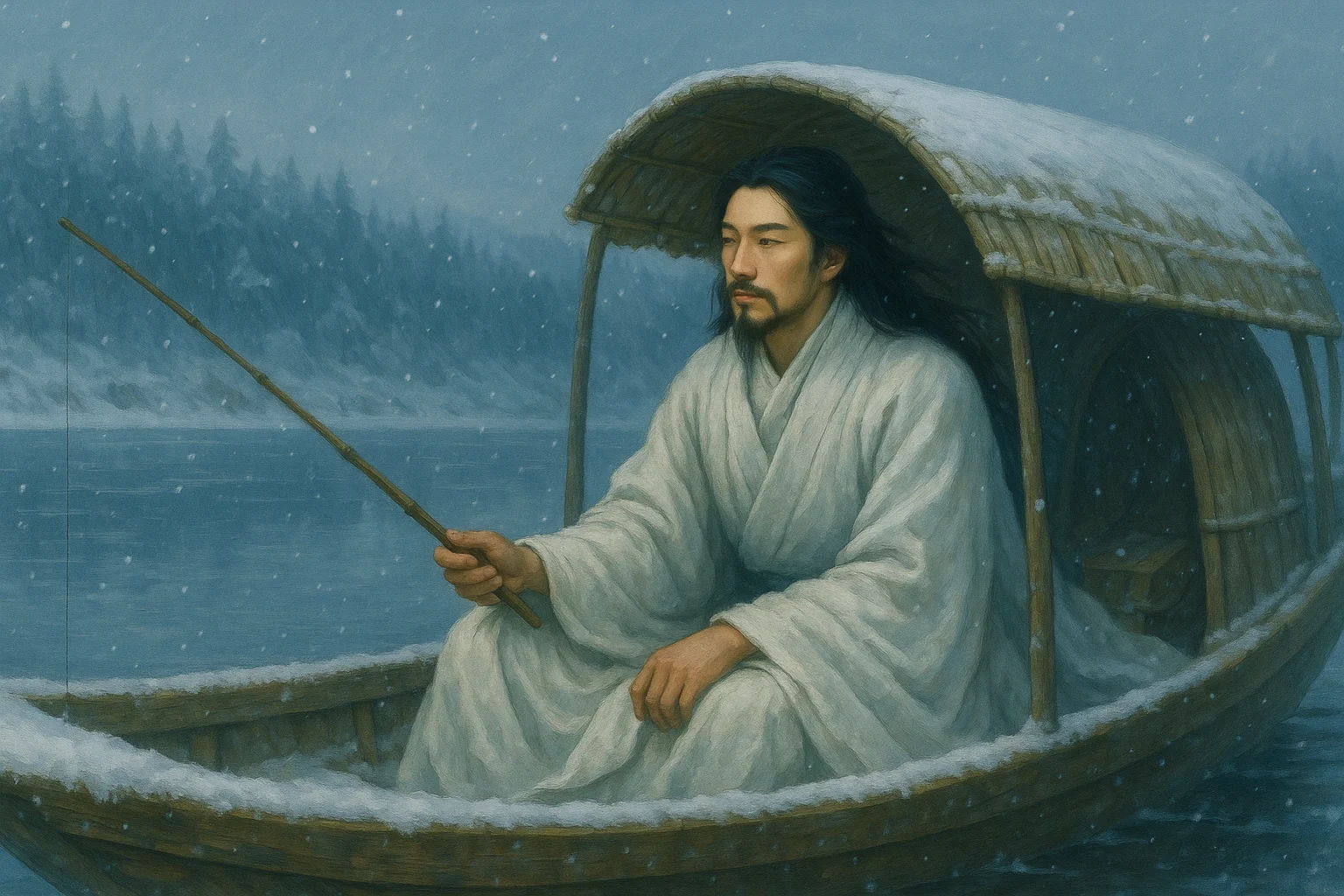
Liu Zongyuan (柳宗元, 773 - 819), a native of Yuncheng in Shanxi province, was a pioneering advocate of the Classical Prose Movement during China's Tang Dynasty. Awarded the prestigious jinshi degree in 793 during the Zhenyuan era, this distinguished scholar-official revolutionized Chinese literature with his groundbreaking essays. His prose works, remarkable for their incisive vigor and crystalline purity, established the canonical model for landscape travel writing that would influence generations. As a poet, Liu mastered a distinctive style of luminous clarity and solitary grandeur, securing his place among the legendary "Eight Great Masters of Tang-Song Prose" - an honor reflecting his enduring impact on Chinese literary history.






